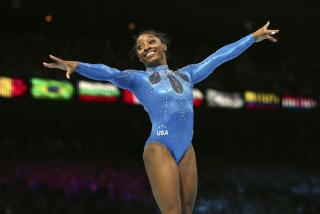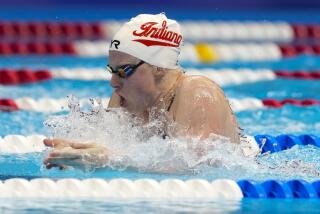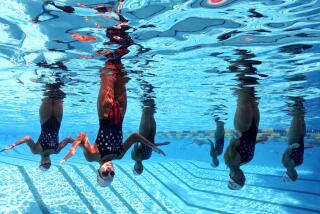VALLEY SPORTS : Olympic Swim Team Berth Eludes Quance
- Share via
INDIANAPOLIS — A lifetime dream was shattered, or at least postponed, Monday night when Kristine Quance was denied a berth on the 1992 U.S. Olympic swimming team in the trials at the Indiana University Natatorium.
Weakened by mononucleosis, Quance, 16, of Northridge, missed a place on the team in the 200-meter breaststroke by 1.3 seconds with a time of 2 minutes 29.89 seconds.
Quance finished behind Anita Nall, the world-record setter, and Jill Johnson. Only the top two swimmers in each individual event advance to the Olympic Games next summer in Barcelona, Spain.
Although Quance trailed Nall from the start, she stayed in second place until the final 25 meters of the race.
At that point, Johnson, 22, of the Massachusetts Bay Marlins passed her.
“I knew if I had any chance of making the team I had to put the mono out of my mind,” Quance said. “I went out fast this time (compared to morning preliminaries) but the mono took its toll. I was hurting so bad the last 20 meters. My arms and legs weren’t moving. I got so tired and I was so tight at the end.”
Bud McAllister, Quance’s coach at Calabasas-based CLASS Aquatics, said she went out too fast in the first 100 meters.
“We knew she had to go faster than she did in the morning, but she got revved up and went all out,” McAllister said.
When asked if the fatigue from the mono kicked in at the end of the race, McAllister said, “It’s hard to say. You can’t say she would have made it without being sick because it’s not fair to the two other girls.”
Quance felt that she had to take a chance in the early stages of the race and hope that she could hang on.
“The problem is I still don’t know how sick I am,” Quance said, “how much longer I am going to have it. I should have known I would probably die (fade at the end), but I had no idea where I was coming into this meet. I had no clue what the clock would say.”
Initially, Quance could not understand why she was sleeping so much in the weeks before the trials. Eventually, she had to set an alarm to wake her for afternoon practice, not to mention her 5:15 a.m. sessions.
Her life became a blur of swimming, sleeping and swimming, and sleeping was winning out.
For the first time in her swimming career, Quance was going slower despite attempts to work harder than ever.
“I felt like I would never swim fast again,” Quance said. “I was devastated.”
If not for dramatic evidence--the discovery of apple-sized swollen glands in her neck--Quance, her parents and McAllister would have continued to attribute her constant need to sleep to the rigors of her demanding training schedule.
The glands, as well as eyes so swollen shut that a fellow church member thought she had been injured, prompted a visit to the doctor who diagnosed mononucleosis.
In a sport that lingers in the spotlight only once every four years, Quance’s timing was horrendous.
Her ranking as second-fastest in the world in the women’s 200 breaststroke would be forgotten because she earned it in 1991, not in an Olympic year.
Quance’s choices? Toil four more years for the chance to make the 1996 Olympic team or stick with plans to compete in the ’92 trials despite the effect her illness has had on her training and endurance.
Quance considered not making the trip to Indianapolis.
“It was really hard,” Quance said. “When I found out I had it (mononucleosis) I can’t even explain how I felt. I thought it was all over, that I had no chance.”
After failing in a gutty effort to give herself a chance, Quance plans to continue swimming in an effort to make the ’96 Olympic team. She is heartened by the knowledge that Pablo Morales and Summer Sanders missed out in ’88 and made it for ’92.
“Maybe this will give me more incentive to work harder,” she said. “Maybe if I make it in ’96 it will mean that much more.”
More to Read
Go beyond the scoreboard
Get the latest on L.A.'s teams in the daily Sports Report newsletter.
You may occasionally receive promotional content from the Los Angeles Times.







